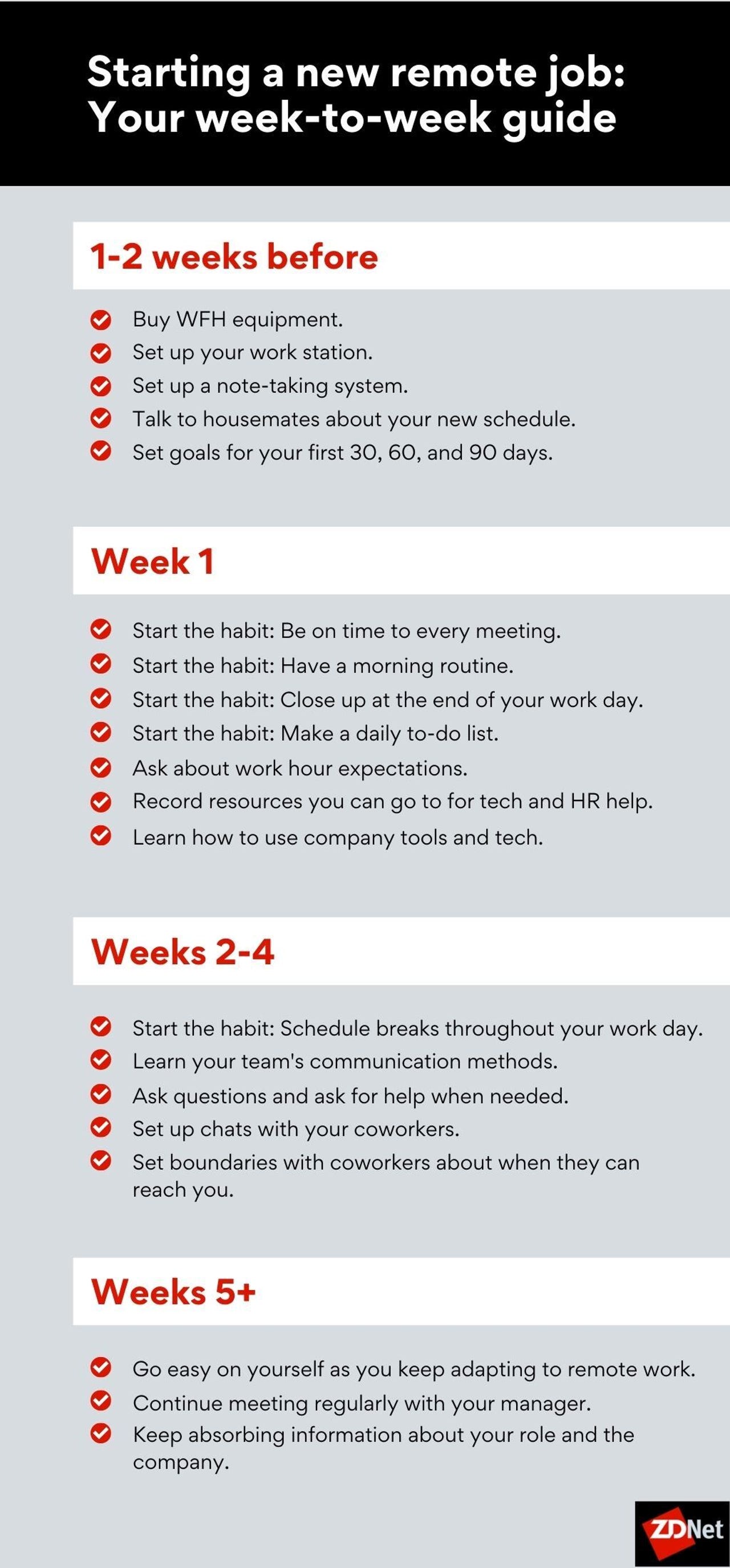Starting a new remote job? Your week-to-week guide

Congratulations! You landed a new job and it's remote. Securing any job is great news, but a remote position gives you even more to get excited about.
For example, you no longer need to get up early to get ready and commute. Your work clothes can be whatever you find comfortable and your office can be wherever you like. But remote work has its challenges, too. You will need self-discipline and motivation to ensure you remain productive.
To get you started, we put together a step-by-step guide for beginning a new remote job. We provide you with weekly to-do lists to help your job transition succeed.
Quick look
1-2 weeks before starting your new job
1. Buy any equipment you need for working from home.
The equipment you need depends on your new job, but it should help make you more comfortable and effective.
Get the computer and software you need, along with a keyboard, headphones, webcam, and whatever else your job requires. If your employer provided a computer, check that it works.
Other useful remote work tech might include a comfortable chair and a standing desk to break up long periods of sitting.
2. Set up your work station.
The right work station will keep you comfortable and productive during long work days. Ensure you have the right lighting and your computer at the right height. An effective work station will reduce eye, neck, and back discomfort and can boost your mental health.
A dedicated office can also improve your focus by reducing distractions.
3. Set up a note-taking system to use during onboarding.
When you start a new job, you need to record and reference a lot of information. Make sure you create a system that helps you organize and access all your notes and information from the onboarding process.
This might be as simple as keeping a notebook or a physical filing system. You might also try productivity software, such as Notion and Evernote.
4. If you live with others, talk with them about your workday boundaries.
When you work from a shared home, you may encounter noise and distractions throughout the day. Discuss your work schedule and demands with other home occupants to avoid issues.
Try to limit noise and disruptions during your work hours. You could even coordinate your breaks to accomplish home tasks without losing valuable work time.
5. Set reasonable goals and intentions for your first 30, 60, and 90 days.
Making plans and setting goals can help you stay on target and focused, empowering and motivating you. When beginning a new job, try setting goals for the first 30, 60, and 90 days.
Brainstorm performance, learning, and personal goals related to your role. These goals might include:
- Make a good impression
- Find a mentor
- Contribute something useful
- Build a personal brand
- Understand the company culture and strategy.
Set up your home office
- Work from home: Essential gadgets and gear for productivity and good health
- Remote work: 10 ways to upgrade your working from home setup
- Best home office equipment
Week 1 of your new job
1. Start the habit of being on time for every meeting.
Time is a valuable commodity, so promptness matters at work. Even when you work remotely, you should aim to be on time for every event you attend, especially when starting a new job.
Get in the habit of showing up early to meetings and gatherings.
2. Start the habit of having a morning routine.
Morning routines might seem like a lot of work, but this self-care time can put you in a great space to start your day. Give yourself time to wake up, wash up, and eat breakfast. You may also exercise, meditate, or read a book.
This morning regime will be easier to complete once it becomes a habit. You'll feel awake and energized to start work.
3. Start the habit of closing up for the day.
Remote workers may find work consuming all their time if they cannot draw a line between work and home. They may suffer undue stress and disrupted home life.
Separate your time with clear end-of-work signals, such as shutting your computer down, clearing off your desk, or turning off the office light. It might help to disable your work app notifications and avoid answering emails during the evening.
4. Start the habit of making a to-do list.
Remote workers can fall behind and lose track of tasks without structure. One effective way to manage your daily duties is to create a to-do list.
Write out your goals and your tasks for the day and the week. Your list will help you focus on work and hold yourself accountable if you procrastinate.
5. Find out about expectations for work hours: set or flexible?
Remote workers are often digital nomads who can work from anywhere as long as they have their computers. Schedule expectations vary by organization, however.
Find out what your employer expects from your work schedule. Do you need to work specific hours, or do you have flexible hours? If you can choose, try scheduling work during the hours and days you are most productive.
6. Save the resources you can go to for help.
Make sure to organize your most important resources and keep them handy. Include IT support and HR documents and contacts.
You also want to keep track of the platforms and applications you need for your new job. Bookmark all your useful web pages and get on any relevant email lists.
7. Spend time understanding how to use the company's tools and tech.
Learn the ropes and get a feel for your job's essential tools and technology. Review all technology onboarding documents and ask questions.
If you spend the time learning the tech early, you can avoid playing catch-up later when you're even busier.
Weeks 2-4 of your new job
1. Learn your team's communication methods.
Communication is important for most professionals. For remote workers on a new job, it's essential.
Figure out how your company communicates and what platforms they use for each function. Get comfortable with the programs they use and know who to go to for questions. Learn how often your managers want you to check in.
2. Keep asking for help when you have questions.
Supervisors, managers, and mentors expect to field questions from employees in new jobs. Take advantage of this opportunity to get as much information as possible.
Be sure to note down all the answers and advice you get. If you avoid repeating questions, you'll show your superiors you value the help you have received.
3. Set up chats with your coworkers.
Just because you work remotely does not mean you have to be isolated. Take the time to get to know your coworkers.
Set up coffee chats. Meet for 20-30 minutes and ask them professional and appropriate personal questions. Find out their job duties, how you can help each other, or what they do for fun.
4. Get into the habit of scheduling breaks throughout your workday.
In most cases, remote work does not require as much activity as an onsite job. Be proactive about your breaks.
You can compensate by adding physical activities, such as working out, taking a walk, or going out for a coffee break with a friend. Standing regularly or stretching out your arms, back, and neck can positively affect your physical and mental health.
5. Set boundaries around when your coworkers or managers can reach you.
You may need to establish your availability to coworkers and managers. If you find your work disrupts your home life because of constant calls and urgent emails, something needs to change.
Share your schedule with managers and coworkers. You can even set an out-of-office reminder on your email or voicemail to help limit after-hours calls.
Weeks 5+ of your new job
1. Continue meeting regularly with your manager.
With time, you will be more comfortable in your new job. You should, however, continue regular communication with your managers and supervisors.
As you grow in your position, your goals and questions will also evolve. Keep the dialogue moving and be clear on your employer's expectations and goals for you.
2. Keep absorbing information about your role and the company.
Even after five weeks of work, you should still be learning.
Continue taking notes and learning from your peers and the situations you encounter. Even the most experienced professional can learn new tricks, so stay in "sponge mode" and absorb everything.
3. Don't be so hard on yourself.
Remote working is a skill that needs refining, like any other ability. If this new landscape gives you challenges, be patient with yourself. Find out what strategies and schedules work best for you and scrap everything else.
Dedicate effort to identifying what motivates you and building your emotional intelligence. The more you understand yourself, the quicker you will master remote work.
In conclusion
Combining a new job with a new type of work may not be easy, but there are many benefits to remote work. Use this guide to help you make the most of your first several weeks.
Complete and integrate as many of these week-to-week tips as possible, and you'll be thriving in no time.
